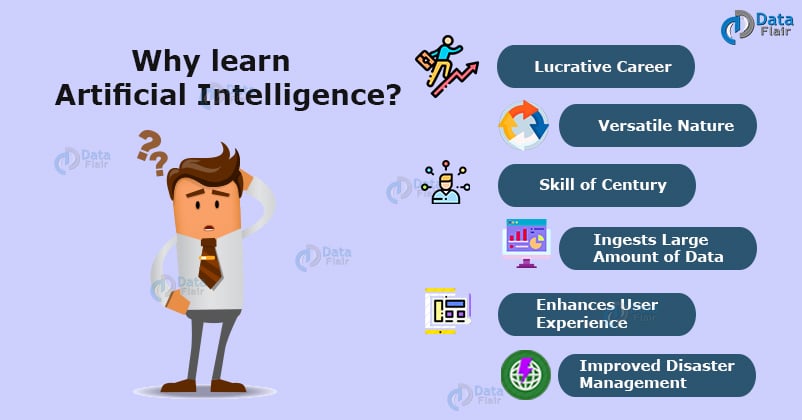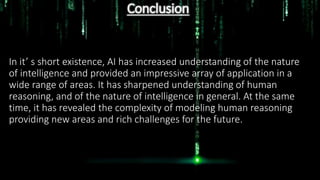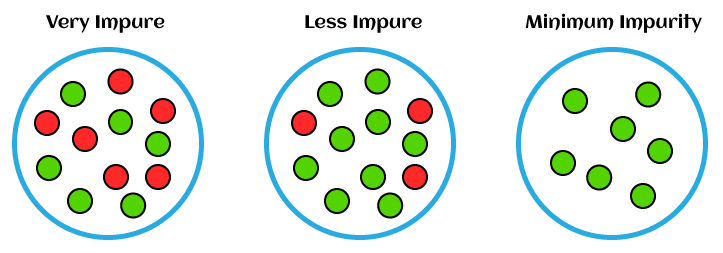Artificial Intelligence, or AI, has been making waves in the tech industry in recent years. With the rise of automation, machine learning, and big data, companies are investing more and more in this field. But it’s not just about business – AI has the potential to transform our world in countless ways, from healthcare to transportation to education. This is why so many people are now asking themselves: why do I want to learn artificial intelligence?
One reason is the sheer excitement of it all. The idea of creating intelligent machines that can learn, reason, and make decisions on their own is fascinating to many. It taps into our innate desire to explore the unknown and push the boundaries of what’s possible. And with AI evolving at such a rapid pace, there’s always something new to discover and learn. But beyond the thrill of the technology itself, there are also practical reasons to study AI – from career opportunities to social impact.

Why Should You Learn Artificial Intelligence?
Artificial intelligence (AI) has become a major part of our lives, ranging from healthcare to entertainment. It is used to create smarter and more efficient systems, while also providing us with more sophisticated tools to solve complex problems. As a result, learning AI is becoming increasingly important for those who wish to stay competitive in the technology industry.
Benefits of Learning AI
By learning AI, you will be able to develop innovative solutions to challenging problems. You will also gain the skills to design and build intelligent systems that can think, reason, and learn. These systems can be used to automate tasks and make decisions quickly and accurately. As a result, organizations that are able to incorporate AI into their operations will be able to gain a competitive edge over their rivals.
AI can also help you to become a better problem-solver. By studying AI, you will gain the ability to see patterns in data and develop strategies to address complex issues. Additionally, AI can help you to identify potential risks and opportunities in various scenarios, which can help you to make better informed decisions.
What You Need to Know to Learn AI
To learn AI, you will need to understand the basics of programming, machine learning, and artificial intelligence. You should also have a good understanding of the different algorithms used to solve problems. Additionally, you should have a good grasp of mathematics and statistics, as these are essential for creating AI systems.
You will also need to understand how to use data to build AI models. This means that you will need to be familiar with data mining and analysis techniques. Additionally, you should have a good understanding of the different AI techniques, such as supervised and unsupervised learning, reinforcement learning, and deep learning.
How to Get Started with AI
If you are new to AI, the best way to get started is to take an introductory course. This will provide you with a basic understanding of the fundamentals of AI, as well as the different algorithms used to solve problems. Additionally, you should also enroll in a machine learning course to deepen your knowledge of the subject.
Once you have a basic understanding of AI, you can then start to explore more advanced topics. You can do this by attending conferences, reading books, and taking online courses. Additionally, you can also join AI communities and engage in discussions with other AI experts.
Why You Should Learn AI
AI is becoming increasingly important in today’s world, and it is essential for those who wish to stay competitive in the technology industry. By learning AI, you will gain the skills to develop innovative solutions to challenging problems and design and build intelligent systems. Additionally, you will also become a better problem-solver and be able to identify potential risks and opportunities in various scenarios.
Learning AI is also a great way to stay up to date with the latest developments in the field. By taking online courses and attending conferences, you will be able to stay current on the latest trends and technologies. Additionally, you can also join AI communities and engage in discussions with AI experts to gain valuable insights.
Frequently Asked Questions
Learning Artificial Intelligence (AI) can open up a world of opportunities for developers and engineers as the technology is becoming increasingly important in the modern world. Here are some questions about why you might want to learn AI and what benefits it can bring.
Why should I learn Artificial Intelligence?
Learning Artificial Intelligence (AI) can open up a world of opportunities for developers and engineers. AI is becoming increasingly important in the modern world and is finding applications in a variety of fields, such as healthcare, finance, transportation, and robotics. By learning AI, you can gain an in-depth understanding of how these technologies work, which can help you build the skills necessary to develop AI-based solutions for real-world problems. Furthermore, the demand for people with AI skills is expected to grow significantly in the coming years, so learning AI can help you pursue a successful career path.
What are the benefits of learning Artificial Intelligence?
Learning Artificial Intelligence can provide numerous benefits for developers and engineers. AI can help you gain an in-depth understanding of how complex real-world problems can be solved using sophisticated algorithms, which can help you become a better problem solver. AI can also help you develop skills in areas such as predictive analytics, computer vision, and natural language processing, which can be applied to a wide range of projects and applications. Additionally, understanding AI can help you stay ahead of the curve in terms of new technology and stay competitive in a rapidly-evolving industry.
What resources can I use to learn Artificial Intelligence?
There are a variety of resources available to help you learn Artificial Intelligence. There are online courses and tutorials available to help beginners get started with AI. Additionally, there are books, articles, and blog posts that can provide a more in-depth understanding of AI concepts and techniques. Additionally, there are numerous AI conferences, meetups, and workshops that can help you stay up-to-date on the latest developments in the field.
What programming languages are used for Artificial Intelligence?
The programming languages used for Artificial Intelligence can vary depending on the application. Common languages used for AI include Python, Java, C++, and R. Python is the most popular language for AI, as it is easy to learn and offers a wide range of libraries and frameworks for AI development. Java is also widely used for AI development, as it is an object-oriented language and can be used to build complex applications. C++ is also used for AI development, as it offers high performance and flexibility. Lastly, R is commonly used for AI development due to its powerful statistical analysis capabilities.
What careers can Artificial Intelligence be used for?
Artificial Intelligence can be used for a variety of different careers, including those in software engineering, data science, machine learning, robotics, and healthcare. AI is becoming increasingly important in the modern world, and it is finding applications in a variety of fields. Software engineers can use AI to develop sophisticated applications and solutions, while data scientists can use AI to analyze large datasets and make predictions. Machine learning engineers can use AI to create intelligent systems that can learn from data, while robotics engineers can use AI to build autonomous robots. Additionally, AI can be used in healthcare to help diagnose diseases and provide personalized treatments.
In conclusion, the field of Artificial Intelligence is rapidly advancing, and it has become an essential aspect of modern life. Learning AI can open up a world of opportunities in multiple industries such as healthcare, finance, and transportation. As technology continues to evolve, having a basic understanding of AI can enable individuals to remain relevant in their respective fields and stay ahead of the competition.
Additionally, AI can help solve some of the world’s most pressing challenges, including climate change, poverty, and healthcare. Learning AI can enable individuals to develop innovative solutions that can help improve the quality of life for people globally. Therefore, it is essential to learn AI to be part of the solution to the world’s problems and make a positive impact. In conclusion, learning AI is a worthwhile investment that can lead to personal and professional growth while making a positive impact on the world.



